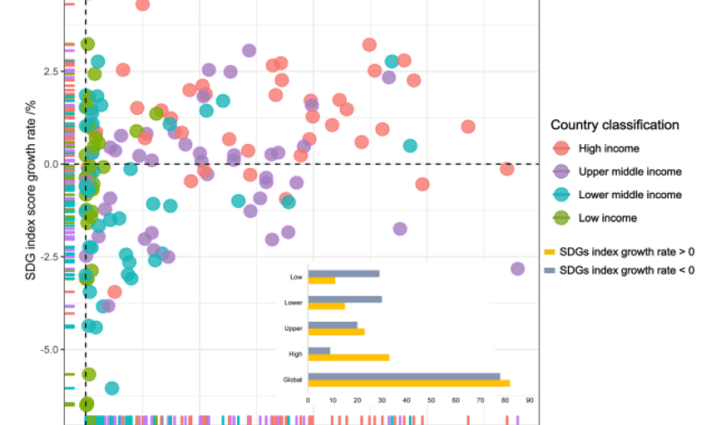The world finds itself at a crossroads, facing a multitude of formidable challenges – repercussions from the Covid-19 pandemic, geopolitical turmoil across the globe, and climate emergencies. The urgency of addressing these issues cannot be overstated.
Governments worldwide stand at a unique juncture where they must chart a course toward sustainable development, simultaneously fostering economic opportunity, averting an ecological collapse, and global well-being improvement. This convergence of priorities brings into sharp focus the 2030 agenda for sustainable development, encapsulating the collective ambition to create a better world.
The UN Sustainable Development Goals (SDGs) consist of 17 interlinked objectives established by the United Nations in 2015. They provide a universal framework for all countries, irrespective of their development status, to address global challenges, enhance well-being, and protect the environment.
These goals serve as a shared blueprint for international peace and prosperity, guiding efforts toward a more equitable and sustainable world by 2030, while encouraging collaboration among governments, organizations and individuals to combat poverty, inequality, environmental degradation, and other pressing global issues.
However, the journey toward realizing these SDGs has been met with unforeseen turbulence, primarily due to the profound impact of the Covid-19 pandemic.
The progress achieved thus far has been dealt a setback of historic proportions, with the COV SARS-2 virus reverberating through global health-care systems and international markets, development finance, undoing breakthroughs and stifling advancements that had been painstakingly forged.

The Covid-19 pandemic emerged as an unprecedented disruptor, severely damaging the SDG agenda. The effects have been felt across the board, with significant declines in global SDG index scores and a concerning increase in poverty, marking the first instance of such regression in decades – an additional 119 million to 124 million people had been pushed into extreme poverty, where South Asia accounts for 60% of this figure.
One of the most pronounced impacts has been on public health and quality of life. The pandemic’s diversion of medical services and the strain on health-care systems have undone decades of progress toward SDG 3 (Good Health and Well-Being). As a result, achieving improved health and well-being for all is now a more formidable challenge than ever before.
Education suffers
SDG 4 (Quality Education), a fundamental pillar of the sustainable development agenda, has suffered significantly.
In 2020, efforts (which some critics found highly questionable) to slow the spread of the respiratory ailment disrupted the educational journeys of more than 1.52 billion adolescents and children worldwide, erasing nearly two decades of academic progress. The repercussions of this setback will likely be felt for generations.
The economic fallout has been equally severe, with the world grappling with its most significant financial crisis since that of 2007-08. During 2020 the world’s collective GDP fall by 3.4%, indicating a substantial decline in economic output. The second wave of Covid-19 resulted in the loss of about 7.5 million jobs, hitting various sectors hard, and severely threatening SDG 8 (Decent Work and Economic Growth).
Ukraine war
Adding to this conundrum, the already complex geopolitical landscape across the globe has only intensified these challenges. The war between Ukraine and Russia is a stark reminder that conflicts in one corner of the world have far-reaching, global ramifications.
It underscores the inextricable link among peace, territorial harmony, and economic prosperity. Armed conflicts have consequences beyond immediate violence; they often result in widespread agricultural abandonment, severely compromising food security.
To be sure, the conflict has disrupted global energy markets, causing fluctuations in energy prices and supply – household energy costs have nearly doubled due to disruptions in the global energy supply chain.
This disruption has been particularly felt in South Asia, where energy markets have been thrown into crisis due to uncertainty in energy supply and increased prices. The collapse of piped gas supplies from Russia has forced countries, including Europe, to seek energy alternatives, often turning to Asia for energy sourcing.
The impact of such conflicts extends beyond the devastation wrought by war itself. Trade wars between significant economies have inadvertently triggered ecological crises, with instances of deforestation and overuse of agricultural land.
The Ukraine-Russia war, for example, has already caused severe damage and loss of life, expanding its reach from population centres to rural areas, and resulting in massive displacement and loss of livelihoods.
According to the UN Security Council, about 14 million people were displaced by the conflict in Europe. This global issue of migration cuts across the entire spectrum of the 2030 Agenda, influencing all 17 SDGs.
Migration-related targets span labor migration, international student mobility, human trafficking, remittances, etc. Recognizing and addressing these complex interlinkages between migration and each SDG is essential for a comprehensive approach to these challenges.
Governments face a pressing need to enhance the accomplishment of the UN SDGs in the face of complex geopolitical and macroeconomic challenges. In the short term, immediate actions are crucial.
Strengthening health-care infrastructure is vital to withstand future health crises, while restoring lost incomes, especially among vulnerable groups, is essential. Ensuring resource security is paramount, particularly for food, water and energy.
Looking ahead, governments must adopt systematic, long-term strategies for inter-departmental cooperation to address the interconnected nature of the SDGs. Identifying and tackling immediate challenges such as poverty, food security, and resource supply is vital. Simultaneously, fostering scientific progress and communication is essential in the longer horizon.

